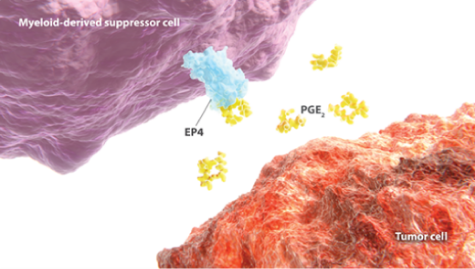EP4

プロスタグランジンE受容体4(EP4)は、自然免疫および獲得免疫を抑制し、腫瘍の進行を誘導します。EP4の阻害により、免疫抑制的な免疫細胞は減少し、自然免疫および獲得免疫が増強されます。
発現および生理的な機能
- EP4は、骨髄由来抑制細胞(MDSC)
 、腫瘍関連マクロファージ(TAM)
、腫瘍関連マクロファージ(TAM)  、樹状細胞(DC)、CD8+エフェクターT細胞
、樹状細胞(DC)、CD8+エフェクターT細胞  、ナチュラルキラー(NK)
、ナチュラルキラー(NK)  細胞 および他の免疫細胞で発現しているプロスタノイド受容体です1-6。
細胞 および他の免疫細胞で発現しているプロスタノイド受容体です1-6。
- EP4は、自然免疫および獲得免疫の両者の機能を抑制するGタンパク質共役型受容体です3,4,7。
- EP4がそのリガンドであるプロスタグランジンE2(PGE2)と結合すると、その後のシグナル伝達により、免疫抑制細胞(例えば、MDSCやTAM)の浸潤が亢進し、免疫エフェクター細胞(例えば、CD8+T細胞やNK細胞)の機能が抑制されます7。
- PGE2-EP4の相互作用は、制御性T細胞(Treg) の分化促進に関与しています7。
の分化促進に関与しています7。
がんでの役割
- がん細胞はPGE2を分泌し、それにより免疫抑制的な環境を作り、腫瘍の増殖を促進します3,7-9。
前臨床のエビデンス
- 前臨床試験では、EP4を介したPGE2シグナル伝達の阻害により、MDSCおよびTAMが減少し、細胞傷害性T細胞およびNK細胞活性が増強されることが示唆されています1-4。
- 研究の結果、EP4と他の免疫チェックポイント経路の両者の阻害により、腫瘍微小環境におけるT細胞の活性が増強されることが示唆されています10。
REFERENCES–EP4
- Hata AN, Breyer RM. Pharmacology and signaling of prostaglandin receptors: multiple roles in inflammation and immune modulation. Pharmacol Ther. 2004;103(2):147-166.
- Majumder M, Xin X, Liu L, Girish GV, Lala PK. Prostaglandin E2 receptor EP4 as the common target on cancer cells and macrophages to abolish angiogenesis, lymphangiogenesis, metastasis, and stem-like cell functions. Cancer Sci. 2014;105(9):1142-1151.
- Sinha P, Clements VK, Fulton AM, Ostrand-Rosenberg S. Prostaglandin E2 promotes tumor progression by inducing myeloid-derived suppressor cells. Cancer Res. 2007;67(9):4507-4513.
- Holt D, Ma X, Kundu N, Fulton A. Prostaglandin E2 (PGE2) suppresses natural killer cell function primarily through the PGE2 receptor EP4. Cancer Immunol Immunother. 2011;60(11):1577-1586.
- Chou JP, Ramirez CM, Ryba DM, Koduri MP, Effros RB. Prostaglandin E2 promotes features of replicative senescence in chronically activated human CD8+ T cells. PLoS One. 2014;9(6):e99432.
- Legler DF, Krause P, Scandella E, Singer E, Groettrup M. Prostaglandin E2 is generally required for human dendritic cell migration and exerts its effect via EP2 and EP4 receptors. The Journal of Immunology. 2006;176(2):966-73.
- Kalinski P. Regulation of immune responses by prostaglandin E2. J Immunol. 2012;188(1):21-28.
- Rong Y, Yuan CH, Qu Z, et al. Doxorubicin resistant cancer cells activate myeloid-derived suppressor cells by releasing PGE2. Sci Rep. 2016;6:23824. doi:10.1038/srep23824.
- Obermajer N, Muthuswamy R, Lesnock J, Edwards RP, Kalinski P. Positive feedback between PGE2 and COX2 redirects the differentiation of human dendritic cells toward stable myeloid-derived suppressor cells. Blood. 2011;118(20):5498-5505.
- Miao J, Lu X, Hu Y, et al. Prostaglandin E and PD-1 mediated inhibition of antitumor CTL responses in the human tumor microenvironment. Oncotarget. 2017;8(52):89802-89810.
















